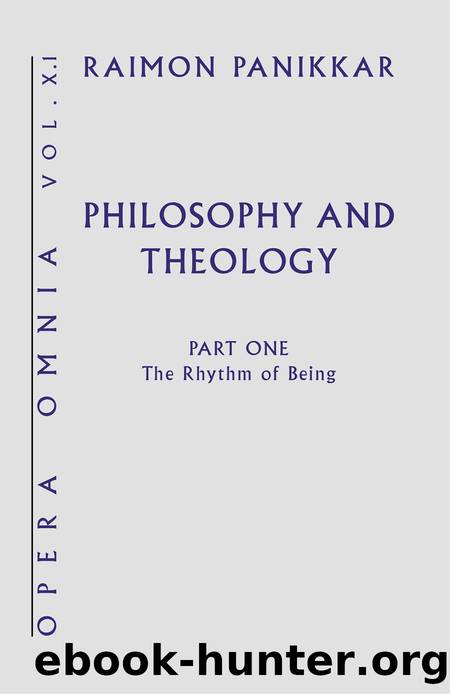Philosophy and Theology: The Rhythm of Being by Panikkar Raimon;

Author:Panikkar, Raimon;
Language: eng
Format: epub
Publisher: Catholic Foreign Mission Society of America, Inc.
Published: 2021-06-19T22:51:55+00:00
(5) Theology as Life
Theology and philosophy are not merely speculative sciences; they are art as much as science, praxis as well as theory. We encounter here again intellectual distinction converted into lethal separation, which is what an adualistic vision of reality hopes to heal. In this sense, and in accordance with most sacred traditions of humanity, theology is a conscious and responsible sharing in divine life. I speak of divine life because of the connotation of the word theology. For an atheist, I would delete âdivineâ and write Life with a capital letter to shift the discussions about content to another level.
In almost all traditions there has been something considered to be the highest and most comprehensive human activity by which the human being reaches Freedom, Happiness, Realization, Salvation, Peace, or any other name such as Heaven, nirvÄâ¦a, or God. If theology is one of the names of this human activity, philosophy, wisdom, dharma, nijñÄna, budhi, tao, and many others could be considered homeomorphic equivalents.
Earlier I referred to the fragmentation of knowledge and present-day cultural schizophrenia. I also said that there is a human need to have an ultimate point of reference, but this point does not need to be a monolithic point. We need a center of harmony where our aspirations find an outlet, a living symbol of our inner peace, a resting place for our thirst for knowledge and our longing for love. Our intellectual and spiritual nature is not appeased by an individualistic solution to this need, nor is it convinced by totalitarian and universalistic ideals. The via media I am trying to describe is that human activity which is sometimes called Wisdom and theology.
Adopting a concrete theological language, we can say that the ultimate aim of theology is working out that consciousness of our fellowship with the entire reality, symbolized by the word Theos, which accompanies us in our life toward its destiny. The theologian is not alone in this pilgrimage. I do not mean, of course, the professional theologian, but any sadhaka, anyone concentrating in living life (human, and thus also intellectual, life) to the full. God is the fellow traveler of the theologian. Theology is the effort to share in Godâs life and to live in harmony with the whole by assuming the responsibility of finishing the divine icon that everyone of us is. Philosophus semper est laetus, âthe philosopher is always joyful,â said a mystical âtheologianâ of the Mediterranean shores centuries ago.61 The theological method, therefore, is not demonstration. Demonstration is a rational method that proceeds from accepted principles to less immediately known âtruths.â The proper theological method is not demonstration but âmonstrationâ to show the splendor of the âtruthâ by polishing both the view and the viewer.
Summing up a long tradition, which has continued after him, Dionysius the Areopagite said that theology âdoes not demonstrate the truth, but exposes it nakedly, in symbols, so that the soul, changed by holiness and light, penetrates without reason into it,â62 implying that the view and the viewer share in that Light which permeates the Universe.
Download
This site does not store any files on its server. We only index and link to content provided by other sites. Please contact the content providers to delete copyright contents if any and email us, we'll remove relevant links or contents immediately.
Signature in the Cell: DNA and the Evidence for Intelligent Design by Stephen C. Meyer(2879)
Real Sex by Lauren F. Winner(2867)
The Holy Spirit by Billy Graham(2777)
The Secret Power of Speaking God's Word by Joyce Meyer(2754)
The Gnostic Gospels by Pagels Elaine(2399)
Jesus by Paul Johnson(2229)
Devil, The by Almond Philip C(2205)
23:27 by H. L. Roberts(2144)
The Nativity by Geza Vermes(2115)
Chosen by God by R. C. Sproul(2055)
All Things New by John Eldredge(2052)
Angels of God: The Bible, the Church and the Heavenly Hosts by Mike Aquilina(1870)
Angels by Billy Graham(1844)
The Return of the Gods by Erich von Daniken(1841)
Knowing God by J.I. Packer(1724)
Jesus of Nazareth by Joseph Ratzinger(1709)
Evidence of the Afterlife by Jeffrey Long(1705)
The Gnostic Gospel of St. Thomas by Tau Malachi(1680)
How To Be Born Again by Billy Graham(1670)
